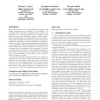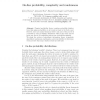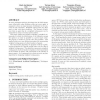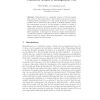337 search results - page 23 / 68 » Game Theory Using Genetic Algorithms |
129
click to vote
SIGECOM
2003
ACM
15 years 7 months ago
2003
ACM
We prove the existence of -Nash equilibrium strategies with support logarithmic in the number of pure strategies. We also show that the payoffs to all players in any (exact) Nash...
116
Voted
ALT
2008
Springer
15 years 11 months ago
2008
Springer
Abstract. Classical probability theory considers probability distributions that assign probabilities to all events (at least in the finite case). However, there are natural situat...
128
click to vote
ATAL
2010
Springer
15 years 3 months ago
2010
Springer
In many multiagent settings, situations arise in which agents must collectively make decisions while not every agent is supposed to have an equal amount of influence in the outcom...
113
click to vote
CORR
2007
Springer
15 years 2 months ago
2007
Springer
Entanglement is a complexity measure of directed graphs that origins in fixed point theory. This measure has shown its use in designing efficient algorithms to verify logical prop...
125
click to vote
IJSR
2011
14 years 9 months ago
2011
Deception is utilized by a variety of intelligent systems ranging from insects to human beings. It has been argued that the use of deception is an indicator of theory of mind [2] ...




